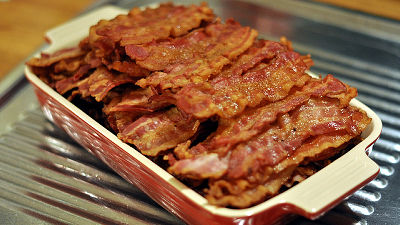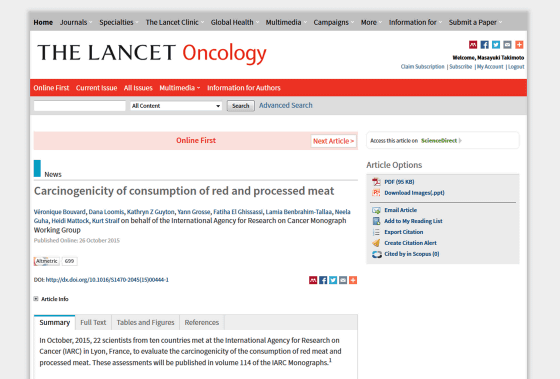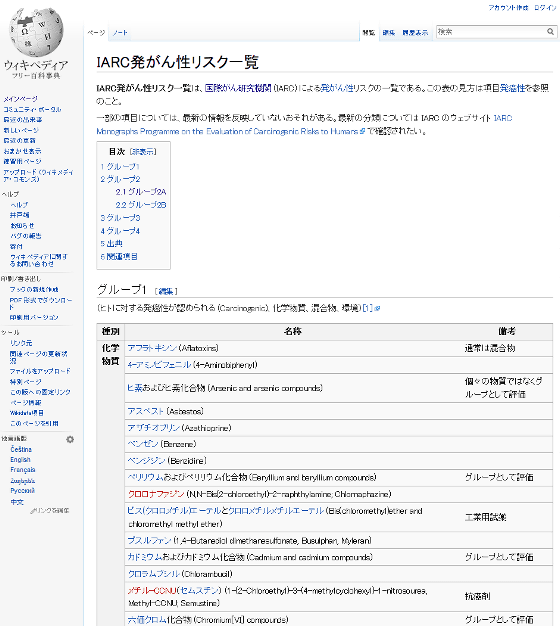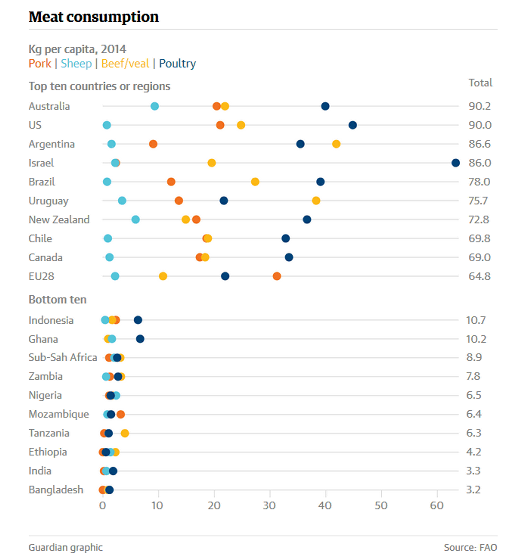WHO announces that there is risk of carcinogenesis in processed meat such as bacon, and a voice of counterclaim immediately gets worse

ByCyclonebill
According to the results of research published by the World Health Organization (WHO), it was announced that the risk of "cancer" will increase by up to 18% by eating processed meat such as bacon, ham, sausage and red meat It was. According to the announcement, the degree of risk has been classified into the same class as smoking, asbestos, arsenic and radioactive substances, but also the counterpart to this content has been revealed on the same day.
(PDF file)IARC Monographs evaluate consumption of red meat and processed meat - pr 240 _ E. pdf

Processed meats rank alongside smoking as cancer causes - WHO | Society | The Guardian
http://www.theguardian.com/society/2015/oct/26/bacon-ham-sausages-processed-meats-cancer-risk-smoking-says-who
This study is an external organization of WHOInternational Cancer Institute(IARC) Working Group summarized and globally published medical journalLancet(Lancet) ". The working group consists of 22 experts from 10 countries.
Lancet's paper can be browsed below. Although it is a registration system, you can register for free.
Carcinogenicity of consumption of red and processed meat - The Lancet Oncology

The IARC expert group increases the risk of developing colorectal cancer by eating 50 grams of processed meat (processed salted, smoked, fermented, etc, for meat such as cattle and pigs) per day As smoking and asbestos at the same level as carcinogenicity standard defined by IARC "Group 1(Chemical substances, mixtures, environments in which carcinogenicity to humans is recognized) ". Also, for red meat such as cattle, pigs, sheep, cows, goats,Group 2(Chemical substances, mixtures, environment with probable carcinogenicity to humans) ".
IARC carcinogenicity risk list - Wikipedia

About this announcement, Dr. Kurt Straif, who oversees the IARC's specialized research program (Monographs Program) said, "For individuals, the likelihood of increasing carcinogenic risk by eating processed meat is low, but it consumes The risk increases with the amount of meat.In view of the situation where there are many people who eat processed meat around the world, the impact on carcinogenicity at the level of all humankind is an important matter in public health, " I tell the meaning.
A graph comparing the top ten countries that are the most eating meat in the world with the top 10 countries that do not eat the most. In Australia and the USA, more than 90% of people eat meat, while in Ethiopia, India and Bangladesh only 5% of people eat meat.

Although shocking research content was announced in a sense, voices of repulsion are raised, mainly in the meat industry etc. as a matter of course. Provide advice on meat and healthMeat Advisory PanelRobert Pickard, a member of the Cardiff University professor, says, "What we understand is that refraining red meat is not an effective strategy to lower the risk of cancer. The most effective way to avoid cancer is to quit smoking and keep standard weight to avoid excessive alcohol intake, "commenting on the relationship between lean meat and cancer incidence is announced.
Meanwhile, IARC's support for the content of the announcement has been raised. UK cancer research institution ·Cancer Research UKProfessor Tim Key says "Cancer Research UK supports the decision that carcinogenic risk exists in processed meat and lean meat released by IARC." Also, a non-profit organization that educates cancer preventionWorld Cancer Research FundHas also suggested refraining from intake as much as possible by pointing out the carcinogenic risk of processed meat over the years.

ByBrave Heart
Also, voices calling for IARC 's logic are raised from non - experts. Startup "Particle"Zach Supalla, CEO of" I've done it for about half an hour "as a conclusion, I refute the meaning of IARC figures.
Processed meats as bad as cigarettes: bad reporting on good science - Medium
https://medium.com/@zsupalla/processed-meats-as-bad-as-cigarettes-bad-reporting-on-good-science-ac43a97be603#.gecy128ir
Mr. Supalla is examining the following two points announced by IARC.
· Effects of eating lean meat: Risk of colorectal cancer increased by 17% (average daily intake is 50-100 grams) with ingestion of 100 grams per day
· Effects of eating processed meat: ingesting 50 grams per day increases the risk of colorectal cancer by 18%
According to statistics of the National Cancer Institute in the United States, the number of people affecting colorectal cancer in the United States is 42.4 per 100,000 males and females,0.042%"Will be. Here, if the occurrence risk rises as expected by actually eating 100 grams of meat of lean meat and 50 grams of processed meat everyday, the occurrence rate is 0.042 × 1.17 × 1.18 =0.058%It will be.
On the other hand, if smoking that is certified to be the same level as processed meat is applied to this, it is said that a completely different situation will be revealed. When comparing the prevalence of lung cancer among nonsmokers and the prevalence rate of smokers, males showed that nonsmokers0.020%Whereas smokers1.259%, Women are non smokers0.025%Whereas smokers1.309%, IARC pointed out that there is a strong influence which is not comparable to the influence of processed meat and disproved the fact that IARC classified smoking and processed meat into the same level.
Mr. Supalla says to expect further verification as "There might be a part wrong with my verification." Both opinions are not necessarily mistakes, and the figures published by IARC are said to be a fact that can never be overlooked in terms of "risk increases". Although it seems that various examination will be carried out in the future, it is likely to be left to the judgment of each person to decide what you emphasize in the end in the future.

ByJack Lyons
Related Posts:







